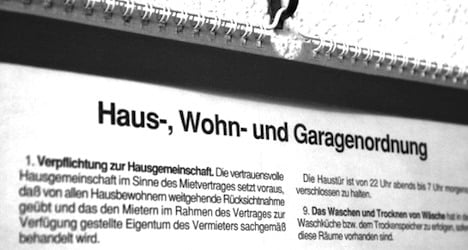Keeping a dog or cat, for instance, will make you ineligible for many rented apartments. As one expat summed it up for The Local: “Finding a decent apartment is always difficult; if you're a foreigner, even with a C (long-term residence) permit, and you have an outdoor cat, it's an absolute nightmare.”
And then there are rules that govern the use of the communal laundry room and taking a bath or shower at night. The tenants’ association in German-speaking Switzerland points out on its website that local police regulations in most areas call for peace and quiet between 10pm and 7am.
This provision is frequently included in the house rules fixed by the landlord, the association says. “This provision stipulates that noisy activities, listening to music and loud laughter or talking must not exceed a tolerable level."
Toilet flushing
Thomas Oberle, a lawyer with the homeowners’ association HEV, says that contrary to popular belief the rental law in Switzerland is not very specific. This means that landlords can interpret the law as they see fit.
They are free to set their own house rules, for example, banning pets or insisting that permission is needed to keep them. There are no blanket Swiss rules that apply to all tenants, in other words, and the oft-quoted “ban” on flushing the toilet after 10pm is an urban myth.
Taking baths at odd hours is another matter. “I wouldn’t recommend running a bath at night as the noise would be inconsiderate,” Oberle tells The Local. “But a clause saying that you can’t use the shower between 10pm and 6am cannot be enforced – provided the person doesn’t take 20 minutes over it.”
According to the lawyer, consideration for others is the watchword and limits need to be set. However, some argue that consideration for the rights of others goes too far and infringes personal freedoms, such as the right to keep an animal.
German ruling raises hopes
The tenants’ association welcomes a recent court ruling in Germany that landlords cannot impose a general ban on keeping pets. Its president, Anita Thanei, told the Blick newspaper this was a landmark decision, and should prompt a legal rethink in Switzerland.
A Swiss Federal Court decision from 1994 makes it clear that where a rental agreement contains a clause banning the keeping of pets, this is binding. Anyone flouting the rule risks eviction.
Oberle of the Swiss homeowners’ association points out though that Swiss law differs from German law in one vital respect. “In Switzerland the tenancy law is formulated in such a way that the renter is not generally responsible for maintenance, unlike in Germany,” he tells The Local.
“If an animal ruins a carpet that is more than 10 years old then the tenant in Switzerland doesn’t have to pay for it,” he says. This works in the tenant’s favour but it may be a reason why many Swiss landlords include clauses in rental contracts banning dogs and cats.
Bone of contention
But perhaps the main reason is that the other residents in the house or block object to house pets. “The keeping of pets is more often a cause of disagreement among tenants than between landlords and tenants,” says Oberle, citing anger over loud barking and dog hairs in the communal washing machine.
Most tenancy agreements, however, do not ban the keeping of animals outright but require renters to seek permission for keeping a dog or cat. Small caged animals and birds can be kept without express permission. Sometimes, where a ban on cats and dogs is in place, it is possible to persuade landlords to show leniency.
Englishwoman Gillian Zbinden found her dream apartment in Thun after two years of hunting. But the advert clearly stated that no animals were allowed.
Invited to meet the owner, Zbinden admitted that she had a cat, but only after she had been virtually promised the apartment. The owner relented. “When we got the contract to sign it was printed ‘no animals allowed’ but the kind gentleman had put a line through that and written ‘one cat allowed’,” she tells The Local.
As the owner of an apartment in Bern, which she rents out, Zbinden sees both sides. She agreed to let her tenant keep a cat and even to fit a cat flap — provided it is removed when the woman moves out.



 Please whitelist us to continue reading.
Please whitelist us to continue reading.
Member comments